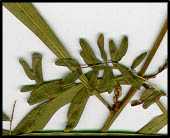South West Slopes Revegetation Guide
Acacia rubida
Red-stemmed Wattle
Select from the following for detailed images.
Species Information
| Synonyms |
|
| Common Names |
Red-stemmed Wattle, Red-leaved Wattle, Red-stem wattle. |
| Family |
Mimosaceae - Mimosa family. |
| Name Origin |
rubida - from Latin ruber, red, referring to red stems. |
Specimen Data - CSU 825
| Location |
Moruya Heads, map no. 8926 436 223. NSW |
| Notes |
Found on a headland in a disturbed area. Zone: Easting: Northing: |
| Collector |
Gadd, Luke & Wise, Phillip |
Date |
01/09/1986 |
| Determined By |
Gadd, Luke |
Date |
24/04/1996 |
South West Slopes Revegetation Guide Information
| Regional: |
Noted in the Murray catchment, from as far west as Long Plain-West Hume, to as far east as Coppabella. |
| Australia: |
Qld, NSW, Vic. |
| Habitat: |
Usually dry sclerophyll forest, Box woodland and heath. Sandy and stony soils. |
| Habit: |
Erect or spreading shrub or small tree 2-10 m high with brownish, finely fissured bark and 'leaves' 5-20 cm long. |
| Similar Species: |
May resemble Hickory Wattle/Lightwood (Acacia implexa). Distinguish by reddish tinge in 'leaves' as they dry, and by retention of bipinnate foliage. |
| Site Preference: |
|
| Characteristics: |
Very hardy and fast-growing. Juvenile bipinnate leaves persist on plant with adult 'leaves', up to 2 m high. |
| Flowering: |
Pale to golden-yellow, Jul-Nov. |
| Seed Collection: |
Early Nov to late Dec. |
| Propagation: |
From scarified seed. Pour boiling water over seeds and soak for several hours before drying and sowing. |
| Regeneration: |
From seed and suckers, particularly after fire. |
| Timber: |
|
| Shade and Shelter: |
Useful low-level cover in windbreaks. |
| Land Protection: |
Useful for controlling soil erosion due to suckering and soil-binding fibrous roots. Legume - improves soil fertility by 'fixing' nitrogen. |
| Wildlife: |
Flowers are a pollen source for native moths, butterflies and other insects. Insect-eating birds attracted. Seed-eating birds attracted, including parrots and native pigeons. Foliage good cover for small birds. |
| Ornamental: |
Valuable ornamental, particularly conspicuous during winter when reddish. Severe pruning after flowering benefits plants. |
| Other: |
|
Note: The following information presented is only a guide, as plant characteristics vary depending on provenance (the plant's locality).
| Site/Preferred Habitat : |
Riverbanks; swamp edges; elevated rocky areas |
| Rainfall(mm) : |
650 |
| Growth Rate : |
fast |
| Tolerates : |
frost; drought; limited waterlogging |
| Resents : |
|
| Uses & Comments : |
windbreak; erosion control; fixes nitrogen; wildlife; ornamental |
Return to Database List
